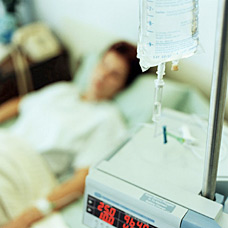 |
Ethical Issues In Hospice Nursing |

ARTIFICIAL NUTRITION & HYDRATION
 Decisions about artificial nutrition and hydration (ANH) are among the most
emotionally and ethically challenging in hospice care. The most difficult dilemma
in ANH is the social and psychological meaning that human beings attach to food and
water. When used in patients near the end-of-life, the American Academy of Hospice
and Palliative Medicine (AAHPM, 2010) suggests these measures are seldom effective
in preventing suffering of the terminally ill.
Decisions about artificial nutrition and hydration (ANH) are among the most
emotionally and ethically challenging in hospice care. The most difficult dilemma
in ANH is the social and psychological meaning that human beings attach to food and
water. When used in patients near the end-of-life, the American Academy of Hospice
and Palliative Medicine (AAHPM, 2010) suggests these measures are seldom effective
in preventing suffering of the terminally ill.
ANH is considered a medical treatment. Therefore, it can be requested or refused by
the patient. This right reflects the respect for a patientís autonomy. If a patient
initially refuses ANH, ethical issues can arise if families or caregivers demand ANH
once the patient becomes incapacitated. One of the major problems with hospice patients
is that there is little evidence of the beneficial effects of ANH on patient comfort.
Moreover, the possible complications of therapy discourage its use for most terminally
ill patients. This is particularly true with fluid therapy which has been reported to
worsen edema and increase respiratory tract secretions, although these outcomes have not
been strongly supported by research (HPNA, 2003).
Since ANH is viewed as a medical intervention, then it should be evaluated by weighing
the pros and cons of such actions in relation to the patientís clinical outcomes. As
the body begins to shut down before death, artificial tube feedings and water are not
processed in the same way as before. Instead of hydrating and nourishing the patient,
the fluids can cause abdominal bloating, swelling, and gastrointestinal problems that
can add or intensify a patientís discomfort. Ethically, the idea that a treatmentís benefits should outweigh its burdens is known
as the principle of proportionality.
This principle can be applied to ANH the same way it is applied to other medical
treatments. Therefore, if a dying patient receiving ANH suffers from its burden which
outweighs the benefits of extending life, then artificial nutrition and hydration may
be ethically withheld whether or not the patient will die sooner as a result of this
action (Calipari, 2005).
